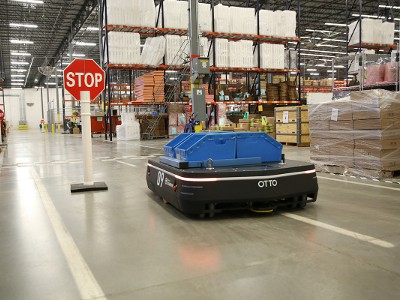
 When Kitchener, Ontario’s Clearpath Robotics unveiled its self-driving warehouse robot, OTTO, last September, a development which the company had long hinted at, they achieved a first-to-market innovation in several important ways, and at least one other way that the company probably didn’t anticipate: its name.
When Kitchener, Ontario’s Clearpath Robotics unveiled its self-driving warehouse robot, OTTO, last September, a development which the company had long hinted at, they achieved a first-to-market innovation in several important ways, and at least one other way that the company probably didn’t anticipate: its name.
Meet Otto, the vehicle that drives itself. Get it? Of course, it’s the name that invented itself.
Uber also, apparently, thought it was a clever enough name when it bought a San Francisco company for a reported $680 million, a self-driving trucking start-up run by some ex-Google employees, including Anthony Levandowski, one of the architects of Google’s self-driving car project.
Clearpath filed a trademark application for OTTO in Canada in September 2015, when they unveiled the vehicle, and another with the US Patent and Trademark Office this past February.
Perhaps realizing that they were about to be outflanked on their own suddenly high-profile brand identity, California’s Ottomotto filed a trademark application with the USPTO for the name “Otto” on March 6, a month later than Clearpath’s application.
So it’s not a huge surprise that on August 24, Clearpath Robotics, Inc. filed suit against Ottomotto LLC in the California Northern District Court for Trademark Infringement.
Clearpath’s OTTO is an autonomous warehouse worker that can handle loads of 3,300 pounds, and move at a speed of 4.5 mph.
OTTO is already in use in several GE Healthcare warehouse facilities in the United States and was recently chosen to supply self-driving OTTO vehicles for a John Deere assembly line operation in Wisconsin.
The California Otto just launched out of stealth mode in May with 91 employees, after a period of testing its proprietary self-driving technology using trucks on highways in the San Francisco region.
According to Clearpath’s trademark infringement filing, “Due to the highly similar nature of the marks, [Clearpath] has already received misdirected inquiries from (1) the press, including a contact requesting that someone from Clearpath participate on Sirius XM’s trucking channel to discuss “Otto self-driving trucks,” as a result of a “recent article”; (2) potential customers have communicated interest in outfitting a tractor trailer with “OTTO,” and (3) [Clearpath’s] current customers, referencing the May 2016 Wired story on Defendant’s Otto, inquired if the trucking system is related to products offered by [Clearpath]. Since the announcement of the impending acquisition of Defendant by non-party Uber, [Clearpath] has also received numerous additional inquiries evidencing actual confusion.”
Uber’s strategy in buying Otto appears more related to acquiring self-driving vehicle technology, rather than to get into the long-haul trucking business, a technology that Uber needs to move closer to reality, and quickly, if it hopes to accomplish its goal of becoming more like a comprehensive logistics platform deeply embedded into every urban environment than just some start-up that ultimately failed to disrupt the taxi industry with an app.
Despite being the highest-profile poster child for the sort of “disruption” touted by start-up culture in the past decade, Uber has managed to lose US$1.2 billion in the first half of 2016, after a humiliating exit from the Chinese market at the hands of its closest rival there, Didi Chuxing.
Back in the U.S., a federal judge rejected Uber’s proposed $100 million settlement with California and Massachusetts drivers participating in a class action lawsuit relating to their classification as either employees or independent contractors.
The Uber situation has had some investors wondering whether it’s possible to short the company, betting on its failure, given the fact that its current US$62.5 valuation is definitely overblown, and there’s only so much longer the company can operate without eventually turning to the public markets, at which point its actual, greatly reduced, value will become obvious.
The fact that Uber paid $680 million for a company called Otto without running some kind of records check to verify that they weren’t stepping on someone else’s toes regarding a registered trademark, seems to be the latest in a string of Uber bad luck.
Leave a Reply
You must be logged in to post a comment.




 Share
Share Tweet
Tweet Share
Share




Comment